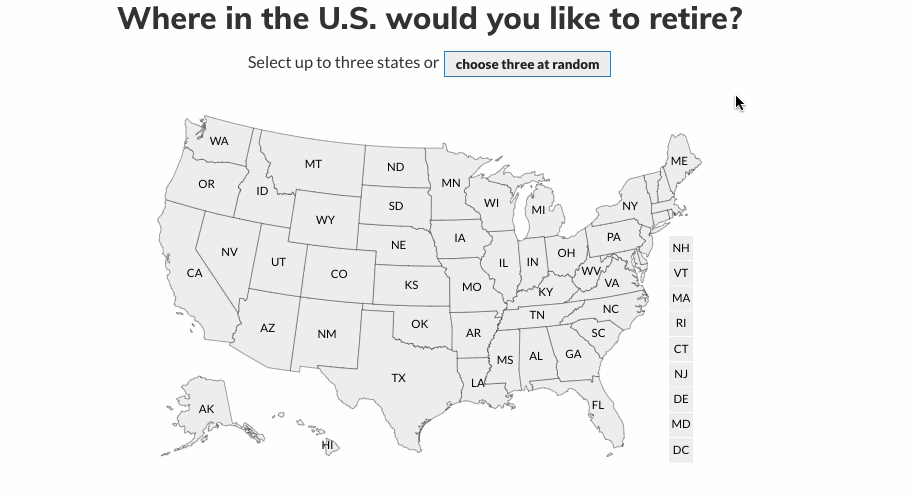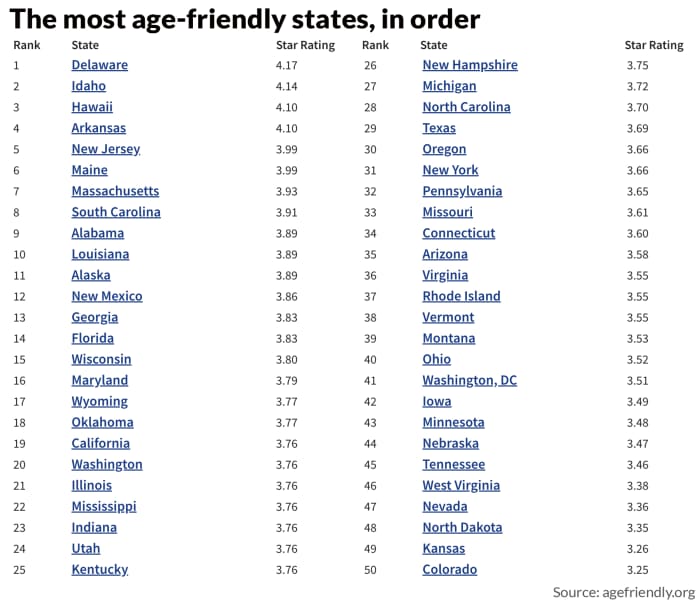#The View From Unretirement: What’s the best place to retire? This new measurement may help narrow it down.

Table of Contents
“The View From Unretirement: What’s the best place to retire? This new measurement may help narrow it down.”
Age-friendliness rankings can help retirees find places that will embrace them
One question that’s top of mind for many people entering, or in, retirement: Where should I live?
Often, the answer is another state — for better weather, lower living costs, proximity to adult children or some other reason. In fact, roughly 234,000 retirees moved to a new state last year, according to a survey from Hire a Helper, an online moving marketplace service.
Read more about where to retire
Ranking states for age-friendliness
Now, there’s a first-of-its-kind ranking of the age-friendliness of all 50 states plus Washington, D.C. from the AgeFriendly.org site.
What makes this ranking different from so many other state lists is that this one is wholly based on what older residents say about where they live.
“The whole premise was that there is a ‘top-down’ rubric for determining what makes an age-friendly city or state. This is meant to be ‘bottom-up,’ where the older adults themselves can weigh in,” said Tim Driver, president of AgeFriendly.org and its umbrella group, The Age Friendly Institute.
To create his ranking, Driver worked with Dr. Alexandre Kalache — who conceived the age-friendly communities program for the World Health Organization (WHO) — to survey people about how age-friendly they thought their communities were.
They used WHO’s eight criteria: community and healthcare; transportation; housing; social participation; outdoor spaces and buildings; respect and social inclusion; civic participation and employment and communication and information.
Where’s the best place for me to retire
New updates: Results by county; filter by politics, snowfall and more

Turning comments into a ranking
After receiving more than 60,000 responses from older residents across America, AgeFriendly.org combined their results with the Net Promoter Score methodology normally used to measure loyalty of customers and the 4 Ms framework for an Age-Friendly Health System from the John A. Hartford Foundation and the Institute for Healthcare Improvement (the 4 Ms are: What Matters, Medication, Mentation or Mental Activity and Mobility).
Then, the site pulled together scores from cities and towns to create state rankings.
And the (often surprising) winners with ratings of more than four stars out of a possible five are: No. 1: Delaware; No. 2: Idaho; No. 3: Hawaii and No. 4: Arkansas.
The cellar dwellers, with 3.25 to 3.36 stars out of five: No. 51: South Dakota; No. 50: Colorado; No. 49: Kansas; No. 48: North Dakota and No. 47: Nevada.
The survey, Driver noted, is “dynamic.” He’ll update and publish new state-by-state rankings every quarter.
“It’s important to look at the results as ‘directional,’” said Kalache. By that, we mean, don’t assume the No. 4 state on the list is worse than the No. 3 state on the list. They are both great places where a lot of older residents are very happy. There is, however, a meaningful difference between No. 3 and No. 30.”
Remember, too, Kalache added, that this ranking is based on how satisfied residents who’ve chosen their communities are with the choice they’ve made. It’s not, therefore, based on data.

Why Delaware is No. 1
As for the current list, Delaware’s a perfectly nice state and, actually, America’s first state to ratify the Constitution. But most age-friendly? (It ranked No. 5 on WalletHub’s latest Best States to Retire and No. 1 on Kiplinger’s Most Tax-Friendly States list, though just No. 40 on Bankrate’s 2022 list of the best states for retirement.)
Delaware’s top age-friendly score came from residents’ comments that AgeFriendly.org received such as these: “there’s neighbors that look out for one another” (Wilmington); “the town has matured from a farm town to a place where all ages are welcomed” (Middletown) and “it is very easy to get around” (Newark).
“We welcome the ongoing feedback from older adults themselves,” said Terry Fulmer, president of the John A. Hartford Foundation. “It’s critical information coming from the true source — older adults — to match existing rubrics for what is age-friendly.”
Ryan Frederick author of “Right Time, Right Place,” a book about choosing where to live in the second half of life, told me: “I’m not surprised by Delaware being a top” place for age-friendliness. Frederick relocated from nearby Maryland to Austin, Texas, a few years ago.
Some surprising results
But Frederick found some of the state rankings in the AgeFriendly.org list surprising, if not wrong.
“I know Washington, D.C.’s been working really hard around their age-friendly status. I’ve seen some of their work firsthand. It’s inherently walkable. There’s a ton of things you can get involved in,” said Frederick. “But they rank really low on this list.” No. 41, specifically.
He expected No. 50 Colorado, No. 49 Kansas and No. 35 Arizona would have been ranked higher, too. Colorado, for one, has been seriously committed to make its state age-friendlier, especially for older workers.
States vs. communities
Is it fair and accurate to roll together one state’s small towns and big metropolises into one overall state ranking of age-friendliness?
Frederick has reservations. “I mean, living in Texas, oh my goodness, it’s like a nation,” he said. “The lived experience in Austin is a lot different than El Paso right now, for example.”
Driver concedes that “you do start to see greater contrasts [for age-friendliness] when you analyze at the city level versus the state level.”
But he believes that over time, as more people add their own age-friendly comments to his ranking, “you will start to be able to see more,” adding that “it’s kind of like TripAdvisor in its early years.”
Age-friendliest vs. best places to retire
Kalache noted that the AgeFriendly.org state rankings aren’t necessarily about a state being a wonderful place to live in retirement.
“Best places to retire lists serve a separate purpose and typically incorporate factors outside the control of community organizers, such as favorable weather patterns,” he said. “Age-friendliness tends to measure how successful community organizers are in adhering to the shared principles and characteristics of age-friendliness: responsive, healthful, equitable, engaging, active and respectful.”
If you’re interested, you can learn more about those principles and characteristics in the 2021 Gerontological Society of America’s Innovation in Aging” article paper that Driver and six others wrote, “Developing a Shared Language to Describe the Age-Friendly Ecosystem.”
The Most Age-Friendly States ranking is worth checking out — if you understand its limitations. Frederick cautions, for example, that age-friendliness can be subjective. “What you think of as age-friendly may be different than what I do,” he said.
But he believes people considering relocating in retirement may want to add the AgeFriendly.org rankings and residents’ comments to their quiver of research arrows.
Driver hopes the states (and communities within them) currently ranking lowest in his list will work harder to make them more age-friendly. “It gives some incentive to leadership to take action,” he said.
By
Richard Eisenberg
If you liked the article, do not forget to share it with your friends. Follow us on Google News too, click on the star and choose us from your favorites.
For forums sites go to Forum.BuradaBiliyorum.Com
If you want to read more News articles, you can visit our News category.




